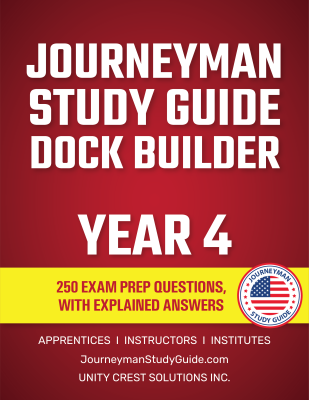Questions, Answers, & Explanations
Get clear explanations behind every answer, perfect for deeper learning and more thorough exam preparation.
Site Updates in Progress: Things might look different as we work on enhancing your experience.
What is a Dock Builder?
Dock builders specialize in constructing, repairing, and maintaining docks, piers, seawalls, and waterfront structures. Their work ensures safe, durable, and weather-resistant marine infrastructure for residential, commercial, and industrial use. Dock builders work with materials such as pressure-treated wood, concrete, steel, and composite decking to create structures that withstand water exposure, corrosion, and harsh environmental conditions.
Key Responsibilities
Dock builders combine carpentry, concrete work, and marine construction skills to complete waterfront projects. Their core tasks include:
Skills and Traits for Success
Successful dock builders need technical expertise, physical endurance, and adaptability to work in changing weather and tidal conditions. Key skills include:
Industries Where Dock Builders Thrive
Dock builders are essential in industries that require waterfront access, marine infrastructure, and shoreline protection:
Why Choose This Career?
A career in dock building offers job security, competitive wages, and opportunities for specialization in marine construction.
Prepare for a Dock Building Career
Proper training in marine carpentry, heavy equipment operation, and structural engineering is crucial for success. Our Q&A study guides, online practice exams, and certification prep resources provide the knowledge needed to excel in this trade.
What to Expect on the Dock Builder Certification Exam
The Dock Builder Certification Exam ensures that professionals meet industry standards for marine construction, safety, and structural integrity. Many maritime construction companies, unions, and government agencies require certification to verify technical skills and OSHA compliance.
Exam Format
The certification exam evaluates both theoretical knowledge and hands-on practical skills:
Key Topics Covered
Passing Requirements
Most certifying bodies require a minimum score of 70% on the written exam. Practical assessments may include demonstrating pile driving techniques, waterproofing applications, or dock assembly methods.
Exam Preparation Tips
Get Ready to Pass Your Exam
Our Q&A study guides, detailed explanations, and online tests help you build confidence and prepare for the Dock Builder Certification Exam.
What Types of Questions Are on the Dock Builder Certification Exam?
The exam assesses technical skills, safety protocols, and industry best practices for marine construction.
Common Question Formats
Sample Questions
Study Smarter, Pass Faster
Our Q&A products break down complex topics, while our Online Tests provide real-time performance tracking.
What Is It Like to Work as a Dock Builder?
Dock building is a physically demanding yet rewarding career that combines carpentry, heavy equipment operation, and marine construction. Dock builders work in coastal, river, and lake environments, often exposed to varying weather conditions and tidal changes.
Morning: Job Site Preparation & Safety Checks
Midday: Construction & Problem-Solving
Afternoon: Final Checks & End-of-Day Procedures
Challenges & Rewards
Ready to Start Your Career?
Prepare for a successful career with our study guides, Q&A products, and interactive online tests designed for dock builders.
What Are the Long-Term Benefits of a Career as a Dock Builder?
Dock building offers stable employment, competitive wages, and opportunities for career growth. Skilled dock builders can advance to roles in marine construction management, engineering, or entrepreneurship.
Career Progression
Top Employers & Career Opportunities
Union & Certification Benefits
Why This Career Matters
Dock builders construct vital infrastructure that supports transportation, commerce, and recreation across the U.S.
Take the Next Step
Advance your career with our study guides, Q&A materials, and interactive online tests tailored for dock builders.
Page 6: Wage Expectations – Dock Builder
How Much Can You Earn as a Dock Builder?
Dock builder salaries vary based on experience, location, and project complexity. Skilled professionals earn competitive wages, especially in unionized roles and large-scale infrastructure projects.
General Wage Ranges
Regional Salary Differences
Factors That Impact Earnings
Want to Boost Your Earning Potential?
Advance your career with our study guides, Q&A products, and interactive online tests to enhance your skills and increase your wages.
Essential Tools for Dock Builders
Recommended Training Programs
Get Equipped for Success
Prepare for certification with our study guides, Q&A resources, and interactive online tests tailored for dock builders.
Where Can You Learn Dock Building?
Dock building requires specialized training in marine carpentry, heavy equipment operation, and structural engineering. Several U.S. trade schools, apprenticeship programs, and unions offer hands-on education and certification pathways.
Types of Dock Builder Training Programs
What to Expect in Dock Building Training Programs
How to Choose the Right Program
Build Your Future in Dock Construction
Becoming a certified dock builder requires technical expertise, hands-on training, and safety certification. Our Q&A study materials and online tests help reinforce key concepts and prepare for certification exams.
Why Join a Union or Work with a Reputable Employer?
Union membership and employment with established marine construction companies provide job security, competitive wages, and career advancement opportunities.
Benefits of Union Membership
Top Unions for Dock Builders
Leading Employers Hiring Dock Builders
What Employers Look For
How to Get Hired as a Dock Builder
Why Unions & Employers Matter
Unions and reputable employers ensure stable employment, high wages, and ongoing training opportunities for dock builders.
Secure the Best Career Opportunities
Enhance your employability by getting certified and joining a union. Use our study guides, Q&A materials, and online tests to ensure success in dock-building industry exams.
How to Stay Ahead in the Dock Building Industry
The marine construction industry is evolving with advancements in materials, automation, and environmental sustainability. Staying competitive as a dock builder requires continuous learning, networking, and adapting to new technologies.
Emerging Trends in Dock Building
Best Practices for Professional Growth
Challenges & Opportunities in the Industry
Staying Competitive in the Job Market
Success in the dock building industry depends on technical skills, adaptability, and professional certifications. Our Q&A materials, Q/A Explanation guides, and interactive online tests help professionals reinforce knowledge and prepare for certification.
Get clear explanations behind every answer, perfect for deeper learning and more thorough exam preparation.
Quick and easy practice to test your knowledge anytime, anywhere—ideal for simple, on-the-go preparation.










